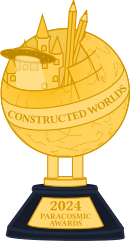Main Page
|
|
|
Information and Assistance
Wiki Administration: Andy Irons (sysop) · Centrist16 (bureaucrat) · Fizzyflapjack (technician) · S.mustafaamir (sysop) · T0oxi22 (sysop) · WorldMaker18 (sysop)
| ||||||||||||||||||||
|
Conworlding, also called worldbuilding, is the process of constructing an imaginary world, sometimes associated with a whole fictional universe. The resulting world may be called a constructed world or a conworld. The term "worldbuilding" was popularized at science fiction writers' workshops in the 1970s. Developing an imaginary setting with coherent qualities such as a history, geography, and ecology is a key task for many science fiction or fantasy writers. Worldbuilding often involves the creation of maps, a backstory, and people for the world. Constructed worlds can enrich the backstory and history of fictional works, and it is not uncommon for authors to revise their constructed worlds while completing its associated work. Constructed worlds can be created for personal amusement and mental exercise, or for specific creative endeavors such as novels, video games, or role-playing games. (read more) From English Wikipedia. |
|
Paracosmic AwardsCongratulations to the winners of the 2024 Paracosmic Awards
And thank you to everyone who nominated and voted!  The inaugural 2024 Paracosmic Awards recognized the outstanding editors, projects, and content on the Constructed Worlds Wiki. Nominations and voting took place in January and February 2024. The 2024 Paracosmos recognized content from 2023 in addition to content from earlier years in the Lifetime Achievement categories.
Project Awards
Content Awards
Lifetime Achievements
|
|
Patron Article of the Month – Nathaniel Cannon by Mythopoeia, selected by Mythpoeia Nathaniel Cannon (June 9, 1836 – November 8, 1917) was an Astorian military officer, statesmen and pioneer who served as the first president of Astoria from 1867 to 1879. Appointed by the Constitutional Assembly as commander of the Revolutionary Army in 1866, Cannon led the forces of Astoria to victory in the Oregon Civil War and the Eugene War. He served on the Provisional Executive Committee and chaired the 1867 Constitutional Secession of the Assembly which promulgated the Constitution of Astoria. In Astoria he is referred to as the "Father of the Republic" and is entombed at the National Adoratory of the Republic. The 1870 Astorian presidential election was the first presidential election in Astorian history. During Cannon's interim presidency, former members of the Republican Party and Canadians from the former British Columbia coalesced into the Whig Party. Although united in their displeasure for Cannon, they had little in common regarding policy. The Whigs nominated George Andrews, a former Hudson Bay Company administrator, as Cannon's opponent. Cannon won the election on September 3, 1870, with 11,328 votes, approximately 64.84% of the popular vote, and 36 electoral votes. In contemporary Astoria, questions regarding the legitimacy of the election still lingers among those in academia but since the early 1980s interest in the matter among the general population has faded. Historians are divided on whether Cannon employed fraudulent means to win the 1870 election, with 58% of the members of the Astorian Association of Archivists and Antiquarians agreeing in 2021 that unethical means were utilized. Only 34% of those belonging to the Arts and Humanities Class, Section II of the Astorian Academy of Arts and Sciences agreed. According to a 2019 poll conducted by National Canvass, 9% of Astorians believed Cannon employed fraudulent means to win the election, 32% agreed that election violence took place during the early republic, and 86% of those polled agreed with the statement "If Nathaniel Cannon utilized fraudulent methods in 1870 to win the presidential election it happened for a just reason." Numerous municipalities and townships have been named in Cannon's honor, and modern attempts to rename counties and medium-sized cities to commemorate him have occurred after his death. Canongrad, with a population of 267,093, serves as the provincial capital of Sakhalin in Ussuria and is the most notable namesake. Cannonsburg, with a population of 21,094, is the prominent namesake in Astoria. Across the country many streets honor him, with the most prominent being Cannon Boulevard in the nation's capitol. Cannon is memorialized by various structures, complexes and buildings across the country, the most significant being the National Adoratory of the Republic, constructed between 1925–1930, and the Cannon Monument between 1965–74 in Asphodele. Cannon is listed and his likeness is depicted among the the pioneers of the Oregon Trail, honored at the Monument to the Pioneers. Fort Cannon, located on the border between Olympia and Tahoma, is the largest military base by manpower and equipment in Astoria.  |








